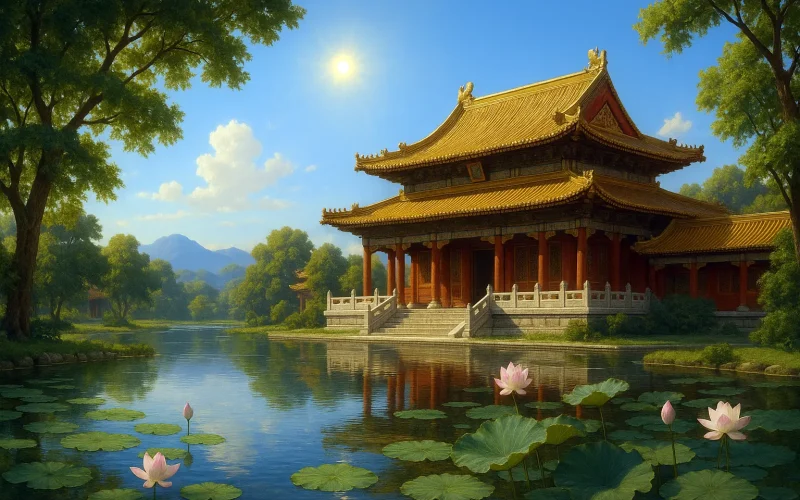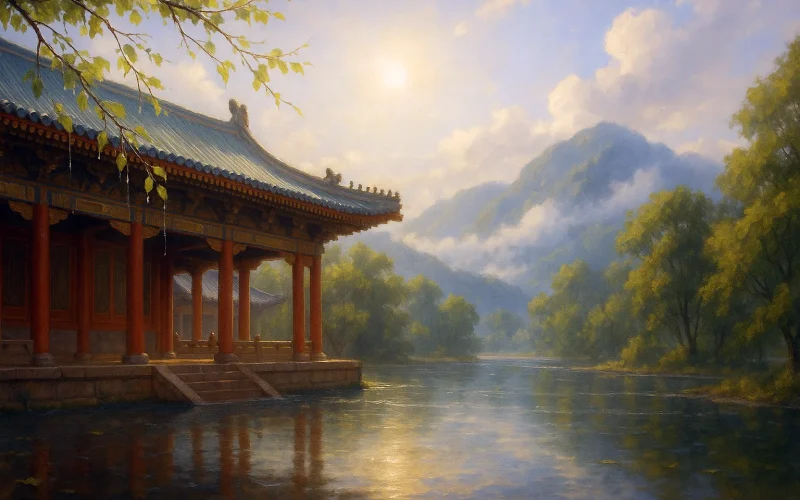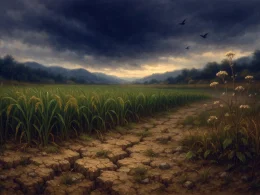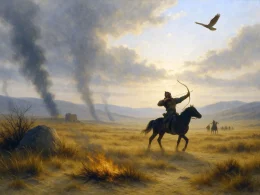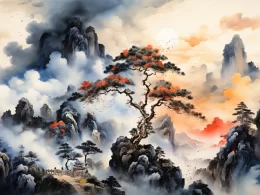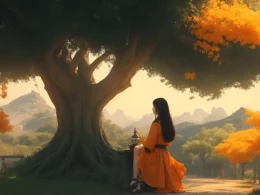I ride to water my horse by the riverside;
The stream is deep, the crossing is denied.
I meet a pompous envoy on the way;
“Our chief has gone to Loulan far away!”
Our cavaliers are checked as in a game;
The foeman’s scouts from their saddles alight.
We go down to the warm pool like a flame;
We climb up the path serpentine in height.
For the extended land, none is awarded;
The lost town’s loss will never be pardoned.
The moonlit Frontier Pass is gloomy still;
Though spring has come, the Mountains cold and chill.
The cloud is dim and shows no shadow now;
The frozen stream can’t mumble anyhow.
I long in vain for you to share this grief;
What can I do? I can’t find more relief!
Original Poem
「相和歌辞 · 饮马长城窟行」
虞世南
驰马渡河干,流深马渡难。
前逢锦车使,都护在楼兰。
轻骑犹衔勒,疑兵尚解鞍。
温池下绝涧,栈道接危峦。
拓地勋未赏,亡城律讵宽。
有月关犹暗,经春陇尚寒。
云昏无复影,冰合不闻湍。
怀君不可遇,聊持报一餐。
Interpretation
This poem follows the old Yuefu title "Watering Horses at the Great Wall Springs," originally a Han Dynasty frontier song often depicting the hardships of garrison life and homesickness. Yu Shinan, writing in the early Tang Dynasty, adopts this traditional form to express the struggles and inner loneliness of frontier soldiers. The poem interweaves the difficulties of campaign travel, the harshness of the borderlands, the lack of recognition for achievements, and the endless longing for loved ones. It not only continues the straightforward style of Han Yuefu but also carries the refined elegance characteristic of early Tang literati.
First Couplet: "驰马渡河干,流深马渡难。"
Chí mǎ dù hé gān, liú shēn mǎ dù nán.
Warhorses gallop to the riverbank,
But the current runs deep, making the crossing difficult.
The poem opens directly into a military campaign scene. "Galloping horses" convey the urgency and tension of the march; "deep current" highlights a natural obstacle. The soldiers face not only enemy threats but also environmental challenges. The phrase "difficult crossing" concludes the line, describing both the actual scene and symbolizing the hardships of the campaign. A sense of pressure is established, seemingly setting a desolate tone for the entire poem.
Second Couplet: "前逢锦车使,都护在楼兰。"
Qián féng jǐn chē shǐ, dūhù zài Lóulán.
Ahead, meets an envoy in a brocade-carriage,
Bearing news: the Protector-General is stationed at Loulan.
"Brocade-carriage" indicates the envoy's high status; "Protector-General" was a Han-Tang official title governing the Western Regions, symbolizing a key defensive post. This detail underscores the seriousness of the military situation: Loulan was already a remote frontier, indicating tense circumstances. This couplet presents both a realistic snapshot of military communication and reflects the strained atmosphere of border warfare.
Third Couplet: "轻骑犹衔勒,疑兵尚解鞍。"
Qīng qí yóu xián lè, yí bīng shàng jiě ān.
The light cavalry still keep bits and bridles ready,
Suspecting the enemy may not yet have unsaddled.
"Bits and bridles" (readiness) and "unsaddled" (rest) create a dynamic contrast, portraying the uneasy border atmosphere: our side remains vigilant, while the enemy might attack at any moment. This couplet avoids direct depiction of battle, instead using the auxiliary words "still" and "may" to build a sense of imminent danger, allowing the reader to feel the soldiers' constant state of alert.
Fourth Couplet: "温池下绝涧,栈道接危峦。"
Wēn chí xià jué jiàn, zhàn dào jiē wēi luán.
Hot springs lie below the sheer gorge,
Plank paths connect the perilous peaks.
The focus shifts to the natural environment. "Hot springs," "sheer gorge," and "perilous peaks" depict a wild and dangerously spectacular landscape, forming a harsh military geography. The formidable terrain implies immense difficulty for travel. This couplet serves not only as realistic description but also emphasizes the hardship and isolation of garrison life.
Fifth Couplet: "拓地勋未赏,亡城律讵宽。"
Tuò dì xūn wèi shǎng, wáng chéng lǜ jù kuān.
Merit for expanding territories goes unrewarded,
But laws for losing a city are never lenient.
This couplet turns from scene to emotion, expressing a heartfelt lament. Soldiers risk their lives, yet their merits go unrecognized; failure, however, brings immediate severe punishment. This contrast reveals the冷酷 of the system and the injustice faced by the soldiers, reflecting the contradiction between military service and the imperial court, filled with somber resentment.
Sixth Couplet: "有月关犹暗,经春陇尚寒。"
Yǒu yuè guān yóu àn, jīng chūn lǒng shàng hán.
Though the moon shines, the pass remains dark;
Though spring has passed, the highlands are still cold.
The border environment mirrors the inner state. The moon, typically a symbol of light and comfort, fails to illuminate the "dark pass," suggesting its inability to dispel loneliness. Spring should bring warmth, but the highlands remain cold, implying that the passage of time brings no change to the soldiers' plight. This paradox deepens the poem's desolate mood.
Seventh Couplet: "云昏无复影,冰合不闻湍。"
Yún hūn wú fù yǐng, bīng hé bù wén tuān.
Clouds loom dark, leaving no shadow;
Ice binds the river, silencing the rapids.
The description of desolate silence intensifies. Visually, there are "no shadows"; aurally, there is "no sound" – an absolute stillness. This extreme quiet and cold elevates the soldiers' loneliness to its peak, the emotion shifting from hardship to bone-chilling solitude.
Eighth Couplet: "怀君不可遇,聊持报一餐。"
Huái jūn bù kě yù, liáo chí bào yī cān.
I long for my sovereign, yet cannot meet him;
Can only offer this meager meal in token of my loyalty.
The conclusion turns lyrical. Despite hardship and isolation, the soldier's loyalty to the sovereign remains steadfast. "Offer this meager meal" is symbolic, representing the gesture of offering one's humble best to the ruler, conveying both loyalty and a sense of helpless resignation.
Holistic Appreciation
The poem is well-structured: the first four couplets depict the perils of the march and the environment, the latter four express inner feelings and reflections. It inherits the realistic simplicity of Han Yuefu while incorporating the refinement and introspection of early Tang literati. The poetic progression moves from the difficulty of crossing the river, to the urgency of the military situation and the dangerous terrain, then to the injustice of unrewarded merit, finally concluding with longing for the sovereign, forming a complete structure moving from scene to emotion. The poem possesses both the vast desolation of frontier poetry and the poignant depth of lyric poetry.
Artistic Merits
- Realistic Imagery: Elements like river crossings, Loulan, hot springs, and plank paths are authentic frontier scenes, enhancing the poem's realism.
- Scene-Emotion Interplay: The desolate environment and the soldiers’ solitude reflect each other, creating a strong frontier atmosphere.
- Blending Real and Implied: The use of words like "still" and "may" creates tension; scenery and emotion build progressively.
- Innovation within Tradition: While straightforward, it possesses a refined elegance, showing Yu Shinan's distinctive style compared to his predecessors.
Insights
This work depicts the harsh reality of frontier campaigns: treacherous river crossings, dangerous mountains and gorges, disorienting wind and snow. It captures both the vast perils of the frontier and the loneliness and longing in the soldiers' hearts. The poem hints at the unspoken sigh for the soldiers' toil and the difficult position of frontier officials through the contrast between unrewarded merit and strict punishment for failure. The line "I long for my sovereign, yet cannot meet him" expresses the bitterness of unrequited loyalty and unfulfilled yearning. It evokes a sense that despite the bitter cold and desolation, the soldiers maintain their loyalty and integrity, using a simple meal as a symbol of their devotion to the country. The poem's insight lies in the idea that character is revealed through adversity and hardship. Recognition or reward may not come immediately, but by holding fast to conviction and duty, one can maintain their integrity amidst the storms of life, leaving behind a path they can be proud of.
About the Poet
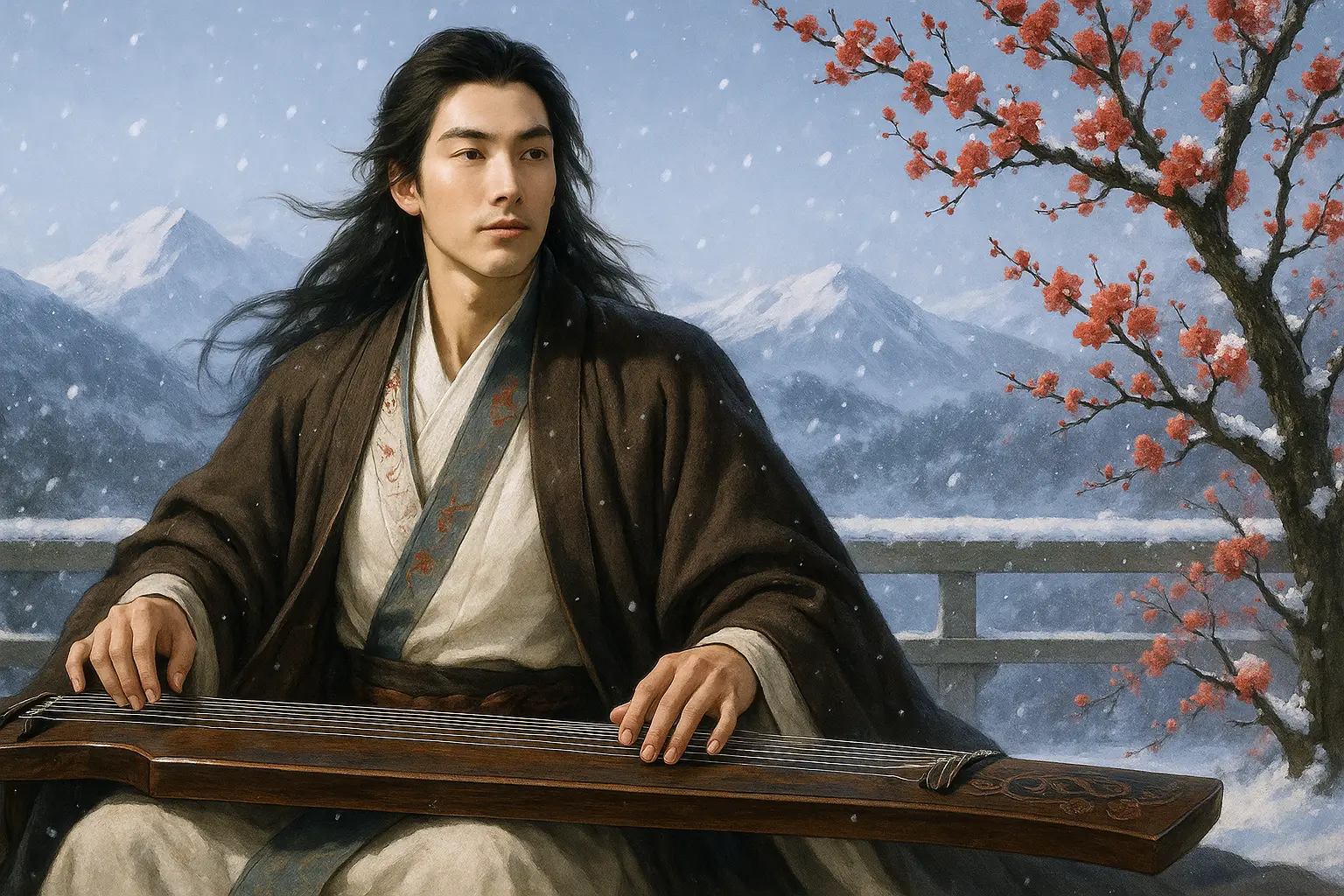
Yu Shinan (虞世南 558 - 638), a native of Yuyao in Zhejiang Province, was a prominent statesman, writer, calligrapher, and politician during the Zhenguan era of the early Tang dynasty. As one of the "Twenty-Four Meritorious Officials of Lingyan Pavilion," he rose to the position of Director of the Imperial Library. His calligraphy earned him a place among the "Four Great Calligraphers of the Early Tang," alongside Ouyang Xun, Chu Suiliang, and Xue Ji. In poetry, he inherited the tradition of Xu Ling and pioneered a refined, balanced, and harmonious courtly style. He also compiled the North Hall Book Excerpts, establishing a new genre of encyclopedic literature.







